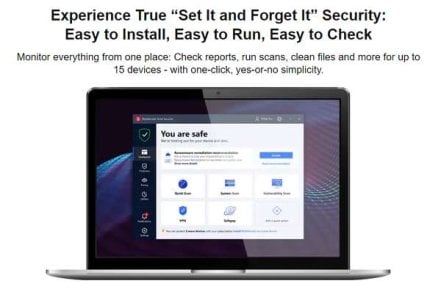Check before you click: Customers warned over dangerous software spreading through fake websites
By
Danielle F.
- Replies 5
Cybercriminals are getting sneakier by the day, and their latest trick is one that could catch even the most careful among us off guard.
For those who want to protect their personal computers from any threats, anti-viruses are often a go-to solution.
However, you should take heed before downloading one for your gadgets.
Researchers at DomainTools Intelligence (DTI) uncovered a worrying scam targeting personal computers.
Scammers have set up fake websites that look just like the official download pages for popular anti-virus programs.
One of these fake websites has copied one of the most famous anti-virus programs, Bitdefender.
The fraudulent site, bitdefender-download[.]com, is a near-perfect copy of the official website.
The fake website was designed to lure unsuspecting users into downloading a seemingly legitimate anti-virus program.
Yet, instead of keeping computers safe, downloading the fake anti-virus program could set off a chain reaction that could put your personal and financial information at risk.
According to the research findings, users will be led to a Bitbucket URL upon download.
This then redirects users to an Amazon S3 storage link.
From there, a ZIP file is downloaded to the computer.
Inside that ZIP file is a program called StoreInstaller.exe.
What's really inside the file is a malware called VenomRAT (Remote Access Trojan).
Malicious tools like StormKitty stealer and a code from the SilentTrinity hacking framework were also found among the files.
Once installed, this malware could steal a user's passwords, observe keystrokes, swipe cryptocurrency wallets, and give hackers remote control over your computer.
In some cases, the criminals could sell access to the computer system to other scammers, putting users at further risk.
The DTI researchers found that the same attacker was controlling several samples of Venom RAT.
Even more concerning was that the infrastructure behind the fake Bitdefender site overlapped with other phishing campaigns targeting banks and IT services.
Several of these phishing websites imitated login pages for Microsoft and the Royal Bank of Canada.
What does this mean for Aussies, especially seniors dependent on their gadgets for daily use?
Cybercriminals are getting more sophisticated as they have learned to build their malware.
This approach has made their attacks more challenging to spot.
While security experts can detect these threats quickly, the real victims are regular internet users who just want to keep their computers safe.
How can you protect yourself?
Run a full scan with your anti-virus software, and consider seeking help from a trusted IT professional.

Have you ever come across a suspicious website or received a dodgy link? What steps do you take to keep your computer safe? Share your experiences and tips in the comments below.
For those who want to protect their personal computers from any threats, anti-viruses are often a go-to solution.
However, you should take heed before downloading one for your gadgets.
Researchers at DomainTools Intelligence (DTI) uncovered a worrying scam targeting personal computers.
Scammers have set up fake websites that look just like the official download pages for popular anti-virus programs.
One of these fake websites has copied one of the most famous anti-virus programs, Bitdefender.
The fraudulent site, bitdefender-download[.]com, is a near-perfect copy of the official website.
The fake website was designed to lure unsuspecting users into downloading a seemingly legitimate anti-virus program.
Yet, instead of keeping computers safe, downloading the fake anti-virus program could set off a chain reaction that could put your personal and financial information at risk.
According to the research findings, users will be led to a Bitbucket URL upon download.
This then redirects users to an Amazon S3 storage link.
From there, a ZIP file is downloaded to the computer.
Inside that ZIP file is a program called StoreInstaller.exe.
What's really inside the file is a malware called VenomRAT (Remote Access Trojan).
Malicious tools like StormKitty stealer and a code from the SilentTrinity hacking framework were also found among the files.
Once installed, this malware could steal a user's passwords, observe keystrokes, swipe cryptocurrency wallets, and give hackers remote control over your computer.
In some cases, the criminals could sell access to the computer system to other scammers, putting users at further risk.
The DTI researchers found that the same attacker was controlling several samples of Venom RAT.
Even more concerning was that the infrastructure behind the fake Bitdefender site overlapped with other phishing campaigns targeting banks and IT services.
Several of these phishing websites imitated login pages for Microsoft and the Royal Bank of Canada.
What does this mean for Aussies, especially seniors dependent on their gadgets for daily use?
Cybercriminals are getting more sophisticated as they have learned to build their malware.
This approach has made their attacks more challenging to spot.
While security experts can detect these threats quickly, the real victims are regular internet users who just want to keep their computers safe.
How can you protect yourself?
- Always download software from official websites. If you're looking for anti-virus protection, go directly to the company's official site.
- Check the website address carefully. Look for slight differences in the URL (like an extra dash or a misspelt word) that could indicate a fake site.
- Keep your operating system and software up to date. Updates often include security patches that help protect against the latest threats.
- Use a reputable security solution. The best way to avoid fake anti-virus software is to have real, trusted anti-virus protection installed on your computer.
- Be wary of unexpected downloads. If a website tries to download a file automatically, or if you're prompted to install something you did not ask for, close the page immediately.
- Enable two-factor authentication on your important accounts, especially for banking and email.
Run a full scan with your anti-virus software, and consider seeking help from a trusted IT professional.
Key Takeaways
- Cyber criminals are targeting Australians with a fake anti-virus website pretending to be Bitdefender.
- The attackers have been using a convincing download page that delivers a ZIP file containing multiple malicious programs, including the VenomRAT.
- This malware could steal passwords, access crypto wallets, and provide remote control over victims' computers for immediate theft or resale.
- Researchers warned that attackers are now using open-source 'build-your-own-malware' toolkits, making these scams more adaptable and dangerous for everyday internet users.








